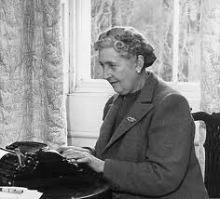Matt Rees's Blog - Posts Tagged "hannah-arendt"
Overturning detective fiction: everyone's guilty in my novels
 The “Golden Age” of the detective story was the 1920s and 1930s. It was a turbulent period. In Britain, the General Strike. In the U.S., the Depression. Civil war in Spain, and in Germany the rise of the Nazis. Red scares everywhere, fascists too.
The “Golden Age” of the detective story was the 1920s and 1930s. It was a turbulent period. In Britain, the General Strike. In the U.S., the Depression. Civil war in Spain, and in Germany the rise of the Nazis. Red scares everywhere, fascists too.But the detective story was a solace to those who lived in such ugly times. In the model employed by Agatha Christie and Dorothy L. Sayers, the story ended with one criminal fingered by the detective. Everyone else turned out to be innocent. Order was restored. It was as if the writers were saying, Don’t worry about what you read in the newspapers; everything can be fixed and only a small minority are making the trouble.
In my Palestinian crime novels, the opposite is true. Everyone’s guilty. Tat’s the reality I found in Palestinian society, as disaster befell it in the last decade – an intifada, a civil war, and now a horrible stand-off between rival factions. Not any one person’s fault.
I believe that’s a better reflection of the world in which we live. My novels are entertainments, but they aren’t layered with the conservative perspective of the “Golden Age.” I don’t want readers to think that there’s nothing wrong out there, so long as the detective nabs the sole bad guy in the library.
Crime novels today are grittier than the work of Christie. They tend to be closer to the atmosphere of Raymond Chandler, who wrote that the Golden Age stories “really get me down.” But the Chandler ethos of a lone knight facing an utterly corrupt world is largely ignored.
That’s why there are so many novels these days about pedophiles and psychopaths. Such characters are beyond the pale of behavior in which we could imagine ourselves participating. To commit a crime in such novels is to mark oneself out as a deviant. As soon as the deviant is nabbed, the society can go back into its usual calm manner.
I think this is why Scandinavian crime novels have been so popular. Readers like the fact that, while the detective wrestles with the psycho, the society depicted is clearly not so very flawed. As soon as the psycho is nabbed, Sweden will return to its pleasant, polite way of life—something that’s easier to envisage than it would be in a novel set in, say, Bangkok or Gaza. Even in his recent novel, “The Worried Man,” Henning Mankell describes his detective as being no more than “worried about the direction of Swedish society.”
Worried! Can you imagine Omar Yussef, my Palestinian sleuth, being no more than worried? He lives in a society that’s engulfed in disaster. He knows everything’s going to hell and he’s aware that nabbing a single bad guy won’t change that.
The golden age method ought to have been overtaken by reality in a post-Holocaust age. Hannah Arendt wrote of the banality of evil, meaning that people don’t choose good or bad, they just go along. We’d like to see bad guys as pure evil, deciding firmly to commit horrible acts, while the truth of the Holocaust and many other dreadful events is that people are much more likely to operate in a kind of malleable denial.
It’s a vital insight. Yet I find most crime novels are written as though Hitler never happened—as if one wicked man can be blamed for what millions of others simply went along with.
Read the rest of this post on my blog The Man of Twists and Turns.
Published on September 09, 2010 02:19
•
Tags:
agatha-christie, crime-fiction, detective-stories, dorothy-l-sayers, hannah-arendt, henning-mankell, hitler, holocaust, intifada, nordic-crime, omar-yussef, palestine, palestinian, raymond-chandler, the-samaritan-s-secret



